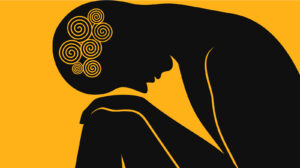Chronic depression is a serious mental disorder that can significantly impact a person’s quality of life. In this article, we’ll explore everything you need to know about chronic depression, including its symptoms, diagnosis, and treatment options.
Contents
What is Chronic Depression?

Chronic depression is a mood disorder that lasts more than two weeks. It’s characterized by a persistent low mood, diminished interest in life, and feelings of sadness, hopelessness, and emptiness.
Chronic depression can severely interfere with your daily activities and relationships. If left untreated, it can lead to major depressive disorder (MDD), a more severe form of the condition.
There is no one-size-fits-all approach to treating chronic depression, but some treatments include counseling, therapy, medication, and complementary therapies such as yoga or meditation. It’s important to seek out professional help if you’re experiencing significant symptoms.
Types of Chronic Depression
Chronic depression, also known as dysthymia, is a form of low-grade depression that lasts for at least two years. It can be milder than major depression but can still have a significant impact on your life. There are three different types of chronic depression:
- Persistent depressive disorder (formerly known as dysthymia)
- Cyclothymic disorder
- Double Depression
Persistent Depressive Disorder (Formerly Known as Dysthymia)
Periods of major depression may be interspersed with periods of less severe symptoms, but the overall picture is one of a long-term low mood. This type of chronic depression can significantly interfere with your ability to function at work or school and enjoy activities that you used to find pleasurable. This type of disorder is also known as dysthymia.
Cyclothymic Disorder
This is a less severe form of chronic depression characterized by periods of low mood (hypomania) and periods of normal or high mood (mania). The symptoms are not as severe as those seen in bipolar disorder, but they can still be disruptive to your life. This type of chronic depression often begins in adolescence or early adulthood.
Double Depression
This is a combination of major depression and persistent depressive disorder. You experience episodes of major depression along with periods of dysthymia. Double depression can be very debilitating, preventing you from functioning at work or school and enjoying activities you once found pleasurable. If you have this type of chronic depression, it’s important to seek treatment as soon as possible.
Causes of Chronic Depression

Chronic depression is a debilitating disorder that can have a serious impact on your overall health. While there is no single cause of chronic depression, there are several factors that can contribute. Here, we’ll explore some of the most common causes of chronic depression, and how you can reduce your risk of developing the condition.
1. Genetics: Chronic depression is a complex illness that often runs in families. If you have a family history of the condition, it’s important to seek out treatment early on to prevent it from developing into full-blown chronic depression.
2. Stressful life events: Accumulating stress over time can lead to chronic depression. Exposure to traumatic events, such as the death of a loved one or significant financial setbacks, can trigger depressive episodes in some people. If you’re struggling with persistent stress, consider seeking professional help.
3. Mental health conditions: If you have any mental health conditions, including anxiety or mood disorders, you’re at higher risk for developing chronic depression. Make sure to get screened for these conditions if you’re experiencing symptoms of chronic depression, and seek treatment if necessary.
4. Biological factors: Certain biological factors –such as genetics, hormonal changes, and physical health conditions – can increase your risk of developing chronic depression. If you’re struggling with a mental health condition, it’s important to get screened for any potential biological contributors.
5. Drug abuse: Chronic drug abuse can lead to serious mental health problems, including chronic depression. If you’re using drugs – or alcohol – to cope with emotional distress, please seek help. Addiction is a serious disease that requires professional treatment.
6. Poor diet: Eating a poor diet is one of the most common causes of chronic depression. Poor dietary habits can increase your risk of developing obesity, type 2 diabetes, and other chronic conditions. If you’re struggling with eating habits, make sure to consult with your doctor or nutritionist to create a health plan tailored to your specific needs.
Symptoms of Chronic Depression

Chronic depression is a serious mental health condition that can be hard to recognize and diagnose. Here are some of the most common symptoms:
Loss of interest in life or pleasure in activities formerly enjoyed
Sometimes a person with this type of depression will feel like a complete failure. They may lose interest in activities that they used to enjoy and may feel tired all the time.
Insomnia or problems sleeping
People with this type of depression often have trouble falling asleep or staying asleep. This can lead to problems with daily functioning, including work and school.
Anguish and hopelessness
Chronic depression can lead to feelings of anguish and hopelessness. People with this condition may find it difficult to see any potential for happiness in their future.
Decreased appetite and weight loss
People with chronic depression often experience a decrease in appetite and weight loss. This is because the person may feel completely drained and exhausted all the time. It can be very difficult to motivate oneself to eat or exercise.
How Does Chronic Depression Affect The Brain?
There is no one-size-fits-all answer to the question of how this type of depression affects the brain, as the effects of this condition vary from person to person. However, some general patterns can be observed when studying the brains of people with chronic depression.
One common finding is that people with this type of depression tend to have a smaller hippocampus – a part of the brain involved in memory and spatial navigation. This could explain why people with chronic depression often have difficulty recalling memories from earlier in their lives or locating specific items in their surroundings. In addition, studies have shown that depressed people are more likely than non-depressed people to experience reductions in brain volume in areas associated with mood and stress regulation, such as the amygdala and prefrontal cortex.
While it is still not fully understood how chronic depression affects the brain, these findings indicate that antidepressant medications may help improve certain aspects of cognitive function in people with this condition.
Diagnosing Chronic Depression
There is no definitive test for diagnosing chronic depression, as the condition can be difficult to identify. However, various diagnostic criteria are typically used to determine whether someone is suffering from the disorder.
The diagnosis of this type of depression is typically based on a person’s symptoms and history. There are many tests like the Beck Depression Inventory and the Hamilton Rating Scale for Depression that can help doctors determine a person’s level of depression. Additionally, a person’s symptoms may indicate whether they are suffering from a more serious form of the disorder, such as major depressive disorder.
Depression Treatments for Adults

There is no one-size-fits-all answer to the question of which depression treatment is best for an individual. However, there are a variety of effective treatments available, and each has its benefits and drawbacks.
Treatment options for adults with chronic depression can include medications, psychotherapy, self-help methods, or a combination of these therapies. Before choosing a treatment, it’s important to evaluate your symptoms and goals for treatment.
Medications for depression can be effective in relieving symptoms, but they also come with some risks. Some antidepressants are known to increase the risk of suicidal thoughts and behaviors in patients, so it’s important to discuss the potential risks and benefits of treatment with your doctor before starting therapy or taking any medications.
Psychotherapy is considered the gold standard for treating depression in adults, but it can be expensive and time-consuming. It can also be difficult to find therapists who are skilled in treating chronic depression. Self-help methods, such as talk therapy or support groups, can be helpful for some people, but they don’t always work as well as professional therapy.
A combination of treatments may be the most effective approach for some people. It’s important to speak with your doctor about which treatment is best for you.
Depression Treatments For Children and Adolescents
There are many different types of depression treatments for children and adolescents, depending on their age, severity, and other factors. A few of the most common treatments include medication, therapy, self-help, and complementary therapies.
Medications are the most common type of treatment for children and adolescents with depression. Many antidepressants are approved for use in this population, including bupropion (Wellbutrin), paroxetine (Paxil), sertraline (Zoloft), escitalopram (Lexapro), fluoxetine (Prozac), and venlafaxine (Effexor). Antidepressants can help to improve moods and decrease symptoms of depression, such as fatigue, sadness, irritability, and problems sleeping. However, antidepressant medications can also have side effects, such as weight gain or decreased appetite. It is important to talk to your doctor about the best antidepressant for your child or adolescent.
Therapy is another common type of treatment for children and adolescents with depression. Therapists may work with the child or adolescent to identify and address the sources of their feelings of sadness or emptiness. The therapist may also teach coping skills and provide support during times of difficulty. Therapy can be effective in treating depression in children and adolescents, but it is important to remember that it is not a cure. It may take several sessions or months of treatment to see the best results.
Self-help measures are also popular treatments for children and adolescents with depression. These measures can include things like talking to a friend or family member about how they are feeling, exercising regularly, trying new foods or activities, taking antidepressants as prescribed, or using other self-help strategies such as relaxation techniques or meditation. While self-help measures are often helpful in improving moods and reducing symptoms of depression, they are not always successful. It is important to continue therapy or medication as prescribed by your doctor if self-help measures do not improve your child’s condition.
Conclusion
If you are reading this article, you or someone you know is likely struggling with chronic depression. Chances are, you have tried many things to help yourself feel better, but nothing seems to work for very long. If you’re feeling lost and don’t know where to turn, read on for some advice on how to address chronic depression and get yourself back on the path to recovery.
Hope this article was of help to you! If you are suffering from mental health disorders, you may seek help from Therapy Mantra. We have a team of highly trained and experienced therapists who can provide you with the tools and skills necessary for overcoming mental health disorders. Contact us today to schedule an online therapy or download our free Android or iOS app for more information.


